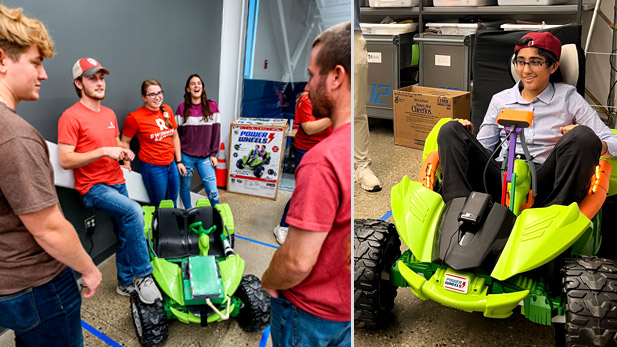Biomedical Engineering Seniors Put Kids with Special Needs in the Driver’s Seat for Fun

This year’s capstone design projects have had biomedical engineering seniors adapting electric toy cars with eye gaze-directed drive technology and other tools to help kids under 5 years old with mobility challenges.
A major emphasis of the biomedical engineering program’s extensive design sequence is developing empathy and understanding for those with special needs – in hopes of creating assistive devices that can make a difference in other’s lives.
Projects being completed this spring by two groups of seniors are achieving that goal by adapting electric toy cars so that kids with mobility challenges can play with others and explore their environment on their own. This is part of an Invent for Good program by the Kansas City-based LEARN’s Geeks for Kids program to change the way kids under 5 years old experience their world by being able to move about and explore freely – not experience life as passive observers from strollers and wheelchairs.
One team enhanced Geeks for Kids’ existing eye gaze-directed drive technology to allow kids with little or no ability to control their body to steer the ride-on dune racer exclusively by the movement of the driver’s eyes. Where they look, the car goes. The car comes to a halt when the driver’s eyes are closed for more than two seconds.
“It was a challenge adapting the technology to calculate eye movements and implementing it into the car’s drive system, replacing the normal steering wheel,” said design team member Neil Bhasin.
Jacob Dirienzo added, “Helping at least one child with the prospect of paving the way for other successful projects in this field of (eye gaze-direction) technology is really satisfying.”
Kai Moore agreed, stating, “It’s taken a lot of work, but we got it done. There’s a lot of satisfaction in accomplishing our goal.”
Another four-senior team implemented bells and whistles on the Geeks for Kids’ cars. A series of buttons and levers will encourage kids with physical challenges to use their bodies in ways that supplement their physical and occupational therapy goals. The Action Challenge designed by the Rose-Hulman team strengthens the kids’ arms and hands and improves their fine motor skills as they plan. Buttons activate a variety of special features – like motor sounds or turning on lights – while pulling on and twisting a series of levers activate pop-out wings and other eye-appealing elements to the car’s body.
“Our new features are physically stimulating and really fun for the kids,” said design team member Garrett Loyed. Other team members were Kevin Beddow, Lindsey Thomas, and Lauren Meyer.
Technology adapted by the Rose-Hulman students may be implemented into future Geeks for Kids cars that would be distributed to kids with the greatest need in the organization’s service area. The two projects completed by Rose-Hulman Biomedical Engineering students are among several Invent For Good projects currently underway by college or high school engineering and technology classes this school year.
“The Rose-Hulman students have been great to work with. Our partnership with the Rose-Hulman biomedical engineering design program has been great for our team and, hopefully, a special learning experience for the students,” said Geeks For Kids President Rebecca Kidwell, a professional engineer who has been a mentor for both Rose-Hulman projects. She has visited campus twice to witness the teams’ progress and is looking forward to seeing the completed projects this summer.
“I have been delighted by what the students have been able to achieve in an inaugural year of what I hope becomes a long-term partnership,” Kidwell stated.
According to LEARN’s Geeks for Kids program, a study published in the Pediatric Physical Therapy journal compared the activity of typically developing toddlers to those with disabilities. The researchers found that typically developing toddlers spend about an hour per day in direct play interactions with their peers, while toddlers with disabilities affecting mobility spend only six to 20 minutes per day in similar interactions. The organization reports that more than 500,000 American kids under 5 years old and many more school-age kids have mobility problems, and few have access to devices that give them free movement. Geeks for Kids strives to give every kid the power to play – to explore, earn, and grow to their fullest potential.